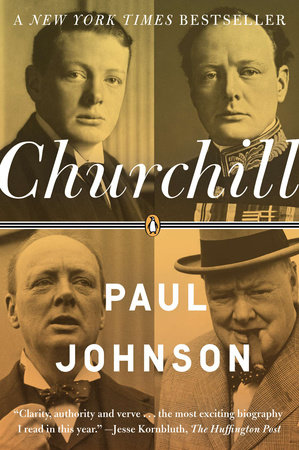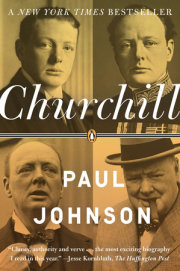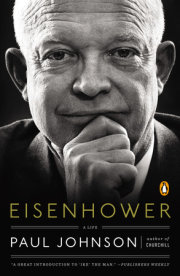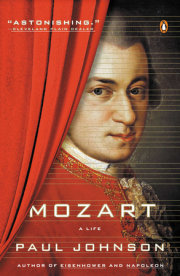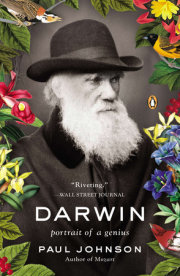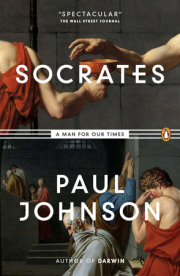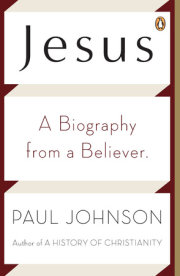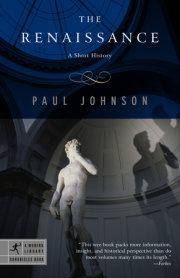Chapter SixSupreme Power and FrustrationAs prime minister and minister of defense, Churchill held power "in ever growing measure," as he himself put it, from May 1940 to July 1945. Probably no statesman in British history had held power for so long in so concentrated and extensive a form. So the first question to ask is: Did Churchill personally save Britain? Was his leadership essential to its survival and eventual victory?
The question is best answered by examining the factors and virtues which operated in his favor—some determined by objective events, others by his own genius and exertions. They were tenfold. First, as a civilian leader, Churchill benefited from a change of national opinion toward the relative trustworthiness of politicians and service leaders—"frocks and brass hats," to use the phrase of his youth. In the First World War, reverence for brass hats and dislike of frocks made it almost impossible for the government, even under Lloyd George at his apotheosis, to conduct the war efficiently. As Churchill put it: "The foolish doctrine was preached to the public through innumerable agencies that generals and admirals must be right on war matters and civilians of all kinds must be wrong—inculcated billionfold by the newspapers under the crudest forms." Lloyd George had the greatest difficulty in sacking any senior figure in uniform and could never take the risk of sacking Haig, the armysupremo on the western front, much as he would have liked to.
By World War II, the truth about the mistakes of the brass hats in the earlier conflict had sunk so deeply into the national consciousness that the position had been almost reversed. There was no war hero until Montgomery made himself one late in the conflict by his own victories. Churchill by contrast came to power with the reputation of having been right throughout the thirties, and was now proved right by the danger in which Britain found herself. He never had to hesitate, except for genuine reasons, before sacking a general, even a popular one like Archibald Wavell, the British commander in Egypt. He felt his authority and exercised it: he was seen walking up and down the empty cabinet room once, after a major sacking, saying aloud, "I want them all to feel my power." Churchill was overwhelmingly admired, even loved, but also feared.
Second, the concentration of power in Churchill's person, with the backing of all parties, meant that there were never any practical or constitutional obstacles to the right decisions being taken. He always behaved with absolute propriety. He told the king everything and listened to all he said: within months George VI had swung right round in his favor and wrote, "I could not possibly have a better Prime Minister." He also observed all the cabinet procedural rules. Above all, he treated Parliament, especially the House of Commons, with reverence and made it plain he was merely its servant. These were not mere formulae. Insofar as Churchill had a religion, it was the British constitution, spirit and letter: Parliament was the church in which he worshipped and whose decisions he obeyed. All this balanced and sanctified the huge power he possessed and exercised. Unlike Hitler, he operated from within a structure which represented, and was seen and felt to represent, the nation. He was never a dictator, and the awful example of Hitler was ever present before him to prevent him from ever acting like one. This was particularly important in his relations with his service chiefs, such as General Alanbrooke, Admiral Cunningham, and Air Marshal Portal. He and the cabinet took the decisions about the war. But the way in which they were executed was left to the service chiefs. Churchill might cajole and bully, storm and rant, but in the end he always meticulously stuck to the rule and left the responsible senior chiefs to take the decisions. This was the opposite of Hitler's methods, and one principal reason why he lost the war. In another key respect Churchill did the opposite of Hitler: all his orders, without exception, were in writing and were absolutely clear. When issued verbally they were immediately confirmed in written form. All Hitler's orders were verbal and transmitted by aides: "It is theFührer's wish…; " Churchill's system of clear written orders, and his punctiliousness in observing the demarcation lines between civilian and military responsibility, is one reason the service chiefs were so loyal to him and his leadership, and indeed revered him, however much his working methods—especially his late hours— might try their patience and bodies.
Third, Churchill was personally fortunate in that he took over at a desperate time. The sheer power of the Nazi war machine, against which he had warned, was now revealed. The worst, as it were, had happened, was happening, or was about to happen. He was able to say in perfect truth, just after he took power (May 13, 1940), "I would say to the House, as I said to those who have joined the government, 'I have nothing to offer but blood, toil, tears and sweat.' " He added, in the same speech, that his aim was quite simple and clear: "Victory at all costs, victory in spite of all terror, victory, however long and hard the road may be; for without victory there is no survival." The last words were of deadly significance, and felt to be so. For Britain was not facing defeat in the sense that it had been defeated in the American War of Independence. It was facing extinction as a free country. Ordinary people were made to feel that. On Churchill's orders, the national anthems of the Allies were played on the BBC before the 9:00 p.m. news every Sunday. There were seven of them, six already defeated, occupied, and under the total control of the Gestapo. Soon, France joined the losers.Churchill certainly did all in his power to save her, paying five perilous visits to consult with her disintegrating, scared, and defeatist government and service chiefs. He would not, however—and rightly—go beyond a certain point. He was prepared to offer France a union of the two states, a most imaginative and adventurous idea, characteristic of his fertility. He was not willing, however, to comply with their request to send all of Britain's precious fighter squadrons to France in a despairing effort to stem the Nazi blitzkrieg. That, he said, would be "hurling snowballs into Hell." Instead, as France lurched toward dishonorable surrender and puppet status under Marshal Pétain, Churchill concentrated on getting the British Expeditionary Force safely back home. And he succeeded. Nine-tenths were rescued from Dunkirk, and many Allied soldiers with them, more than three hundred thousand in all, brought back by an improvised armada of ships, great and small, including pleasure cruisers and fishing boats, which gave picturesque color and even romance to the story, a typically British tale of snatching victory from the jaws of defeat. Thus within a month of taking office, amid the unmitigated catastrophe of France's fall, Churchill was able to report a British victory—Dunkirk—and to speak glowingly of "the Dunkirk spirit." It was in a sense a bogus victory, for the troops had been forced to leave their heavy equipment behind, and in many cases even their rifles, which they had smashed before embarking. But Dunkirk nevertheless gave a huge boost to British morale: now that Churchill was in charge, the people felt that, far from plunging further down into the abyss, the country was moving upward, if only an inch at a time.
Fourth, Churchill himself began to set a personal example of furious and productive activity at Ten Downing Street. He was sixty-five but he looked, seemed—was, indeed—the embodiment of energy. He worked a sixteen-hour day. He sought to make everyone else do likewise. In contrast to lethargic, self-indulgent old Asquith ("the bridge-player at the Wharf," as Churchill called him) or even Lloyd George, who had high tea instead of a proper dinner to discus strategy and went to bed at nine o'clock, Churchill began to wear his own form of labor-saving uniform, a siren suit, easy to put on or take off, in which he could nap if he wanted during long nighttime spells at work. This added hugely to the fast-accumulating Churchill legend: the public called it his "rompers." In fact, thanks to Clemmie, some of these siren suits were of elaborate and costly materials, velvet and silk as well as wool—for "best" parties in the Number Ten bombproof dining room, and so on. Churchill had always used clothes for personal propaganda and had a propensity to collect unusual uniforms. Since 1913 he had been an elder brother of Trinity House, a medieval institution which supervised all lighthouses and port lights in the British Isles. Its uniform had a distinctive nautical flavor and for court dress he always wore it in preference to that of his Privy Council. General de Gaulle, who had by now taken charge of France's resistance forces, asked him what it was and received the mystifying reply, "Je suis un frère aîné de la Sainte Trinité." But the siren suit was the everyday wartime wear and proved a masterstroke of propaganda. In it the prime minister worked within days of taking over, as the first brief and pointed memos and orders flowed out under the famous headline: "Action This Day." So did the endless series of brief, urgent queries: "Pray inform me on one half-sheet of paper, why…; " Answers had to be given, fast. Churchill had teams of what he called "dictation secretaries." He worked them very long hours. He was sometimes brusque or angry, swore, forgot their names, even lost his temper. But he also smiled, joked, dazzled them with uproarious charm and whimsicalities. They all loved him and were proud to work with him. They helped him to turn Number Ten into a dynamo, and its reverberations gradually resounded through the entire old-fashioned, lazy, obstructive, and cumbersome government machine, until it began to hum, too. Churchill's sheer energy and, not least, his ability to switch it off abruptly when not needed were central keys to his life, and especially his wartime leadership. But it must be admitted that he killed men who could not keep up—Admiral Pound, for instance, and General Sir John Dill—just as Napoleon Bonaparte killed horses under him.
The fifth factor was Churchill's oratory. It is a curious fact that he switched it on to its full power just as Hitler switched his off. Hitler had been, in his time, the greatest rabble-rouser of the twentieth century. In his successful attempt to destroy Versailles and make Germany a great power again—incidentally ending unemployment—his oratory had been a vital factor in making him the most popular leader in German history (1933–39). But the Germans, while overwhelmingly behind the campaign against Versailles, had no desire to see Hitler turn Europe into a servile German empire, let alone lead them into a world war. When Hitler marched into Prague in March 1939 it was his first unpopular act. Until now he had ruled mainly by consent. Thereafter it was by force and fear. Sensing his loss of personal popularity, Hitler ceased to address the Reichstag or make public speeches. By the time Churchill took charge, Hitler had retreated into his various military headquarters, mostly underground, rarely appearing and never speaking in public. He became a troglodyte, while Churchill became a world figure ubiquitous in newspapers and newsreels wherever Nazi censorship had no control.
The oratory had two interlocking audiences: the Commons and the radio listener. Here a personal word is in order. I was twelve when Churchill took power and had learned to caricature him since the age of five (I could also do Mussolini, Stalin, and Roosevelt). My father, having served four years in the trenches and lost friends in the Dardanelles, was suspicious of Churchill. In April 1940 I recall his saying, "There's talk of making that fellow Churchill prime minister." But by early May events had swung him round: "It looks as if we'll have to put Winston in charge." By then the nation was calling him "Winston." My father and I read in the newspaper together all his speeches in the late spring and summer of 1940, and listened to all his regular broadcasts. The combined effect was electrifying and transforming. I can remember the tone of voice, the words, many whole phrases to this day. There were two passages in particular. After Dunkirk, and before the last phases in the already lost battle on the Continent, he insisted (June 4):We shall not flag or fail. We shall fight in France, we shall fight on the seas and oceans, we shall fight with growing confidence and growing strength in the air, we shall defend our island, whatever the cost may be, we shall fight on the beaches, we shall fight on the landing grounds, we shall fight in the fields and in the streets, we shall fight in the hills. We shall never surrender.
In the Commons, Churchill characteristically supplemented the passage with a joking aside, sotto voce, "We shall fight with pitchforks and broomsticks, it's about all we've bloody got." Jokes were never far away when Churchill spoke, even in the gloomiest times. He was rather like Dr. Johnson's old friend from Pembroke College: "I try to be a philosopher, but cheerfulness keeps breaking in." Of course we did not know that bit about the pitchforks. But the bit about never surrendering rang true. We believed it, we meant it.
Copyright © 2009 by Paul Johnson. All rights reserved. No part of this excerpt may be reproduced or reprinted without permission in writing from the publisher.

